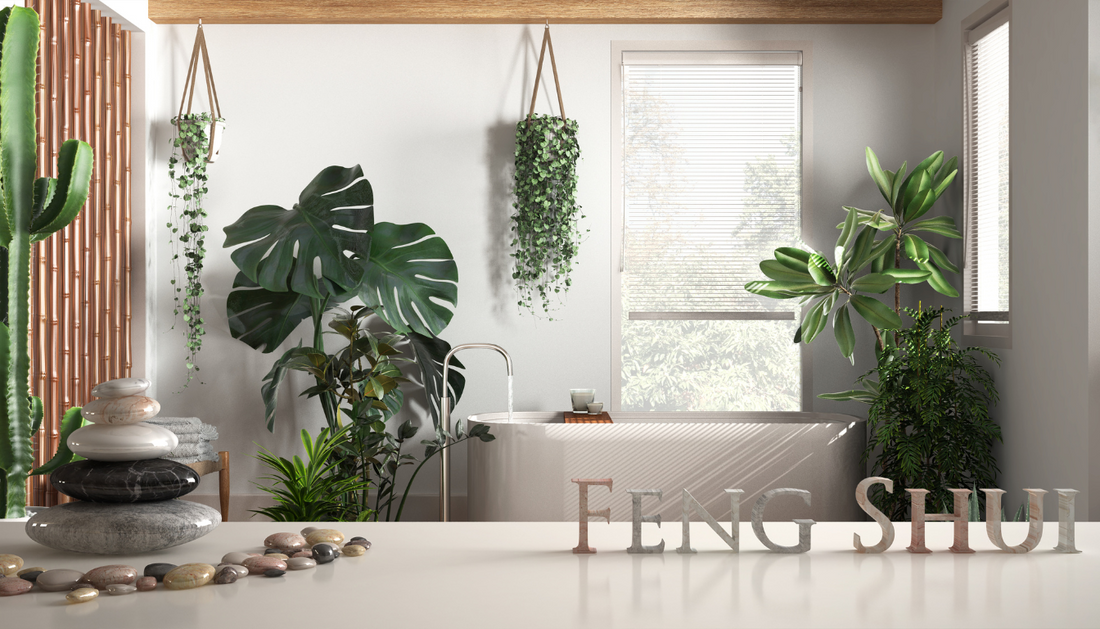
Optimize Your Space with Feng Shui Tips.
Adding feng shui for beginners to your home can make it more peaceful and balanced. Feng shui, an old Chinese practice, is becoming popular in the West. It helps improve your health, work, and personal growth by using how to use feng shui principles.
Research shows that 95% of people who try feng shui feel more at peace at home. Making small changes can greatly affect your life, as 67% see better relationships and money in six months. A good feng shui layout can even raise your home's value by 15-25%.
Feng shui is all about balancing energy, or chi, for health, joy, and wealth. You can do this by adding indoor plants, which make people 30% happier, or water elements for more abundance. Keeping your space tidy can also make 74% of people more productive and clear-minded.
Looking for feng shui tips? Begin by learning the basics. Small changes can make a big difference in your life.

Understanding the Basics of Feng Shui
Feng shui is an ancient Chinese practice. It focuses on arranging objects to attract positive energy. This ensures harmonious living environments. By learning the feng shui principles and feng shui basics, you can bring balance and tranquility to your home.
What Is Feng Shui?
Feng shui means "wind" and "water" in Chinese. It's about harmonizing with your environment. The goal is to cultivate energy or chi by placing furniture and items wisely.
Understanding concepts like yin and yang, the five elements, and the commanding position helps. This way, you can improve energy flow and create a peaceful space.
The History and Origins of Feng Shui
Feng shui has roots over 3,000 years old in China. It started as a way to find good living areas for communities. This practice evolved, adding elements like the five elements and the bagua map.
The Importance of Balance and Harmony
Balance and harmony are key in feng shui. It focuses on the interaction of elements, colors, and shapes for well-being. For example, using the five elements helps balance space energy.

To understand feng shui basics, see how arranging elements changes your home's energy. Placing furniture in the commanding position protects your well-being and career. Keeping your entrance clear welcomes positive energy.
| Element | Colors | Shapes |
|---|---|---|
| Earth | Yellow, Orange, Brown | Squares |
| Metal | White, Gray, Metallic | Circular |
| Water | Black, Dark Blue | Wavy |
| Wood | Green, Blue | Tall, Columnar |
| Fire | Red, Bright Orange | Triangle |
Applying Feng Shui Principles in Your Home
To use feng shui for home well, you need to know the basics. Understanding the five elements and Yin and Yang helps create balance. This makes your home a place of peace and well-being.
Each part of your home can be improved. This includes using the Bagua Map for energy mapping.
The Five Elements: Wood, Fire, Earth, Metal, Water
The five elements – wood, fire, earth, metal, and water – are key in nature. Adding them to your home brings balance:
- Wood: It's about growth and energy. Plants connect you to nature.
- Fire: It stands for passion and energy. Candles and red colors make your space lively.
- Earth: It's about stability. Using earth tones in bedrooms helps your health.
- Metal: It brings clarity. Metallic colors help with focus and wisdom.
- Water: It's about abundance. Elements like fountains bring prosperity.
Yin and Yang: Achieving Energy Balance
Yin and Yang balance is key in feng shui for home. Where you place furniture matters. For example, beds and stoves should be in the "commanding position" for safety.
Aligning bathrooms correctly is also important. It affects your sleep, so placement is key.
The Bagua Map: Energy Mapping for Your Home
The Bagua Map is a key tool in feng shui. It shows how different parts of your home relate to life areas. The center, for health, should be clear for good energy flow.

| Bagua Area | Aspect of Life | Recommended Elements | Colors | Shapes |
|---|---|---|---|---|
| Family | Relationships | Wood | Green, Blue | Rectangles |
| Wealth | Abundance | Water | Purple, Gold | Freeform, Waves |
| Health | Self-care | Earth | Brown, Yellow | Square |
Using these principles makes your home peaceful. It's connected to the deep wisdom of the religious ceremony of enlightenment. Feng shui improves your living space and life overall.
Feng Shui Techniques for Key Areas
Feng shui has been around for over 3,000 years. It focuses on balancing life energy, or Chi, in our homes. Using feng shui techniques in key areas can greatly improve your well-being.
Creating a Welcoming Entrance
Your entrance is key to the energy flow in your home. Make sure paths to your front door are clear. This lets Chi flow freely.
Don't block your door with big objects. Bright lights help welcome positive energy. This can reduce stress and improve health. Water features, like aquariums or fountains, near the door can bring wealth.
Optimizing the Living Room for Positive Chi
The living room is for socializing and relaxing. Use the five elements—Wood, Fire, Earth, Metal, and Water—to enhance it. Each element has its own properties:
- Wood: Green color, rectangular shape
- Fire: Red color, triangular shape
- Earth: Orange, yellow, and earth tones, square shape
- Metal: Gray, pastel shades, white, round shape
- Water: Black and blue colors, wavy shape
Arrange furniture for open communication. Avoid clutter to keep Chi flowing.
Designing a Calming Bedroom
Your bedroom should be a peaceful retreat. Place your bed right, not against walls, for a view of the entrance. Use soft colors and lines for a calm look.
Keep the room tidy to avoid energy blockages. Remove anything negative, like broken items. Wet cleaning is best for removing bad energy.
The Importance of a Clutter-Free Space
Clutter-free homes are key in feng shui. Clutter blocks Chi flow. Clean regularly, wet cleaning is best.
Get rid of broken or unused items to avoid attracting problems. Clear closets and windows, and keep doors open. This boosts your well-being and mental clarity.
| Element | Color | Shape |
|---|---|---|
| Wood | Green | Rectangular |
| Fire | Red | Triangular |
| Earth | Orange, Yellow, Earth tones | Square |
| Metal | Gray, Pastel shades, White | Round |
| Water | Black, Blue | Wavy |
Common Feng Shui Mistakes to Avoid
Using feng shui can really change your home. But, beginners often make mistakes that block good energy. We'll look at common errors and how to fix them for a peaceful home.
Clutter is a big problem for energy flow. Clutter at doors blocks energy, which is bad. Keeping your entryway clean reduces stress, as 75% of feng shui experts say.
Furniture Size matters a lot. Furniture that fits well makes a room feel better. But, oversized furniture is common and bad for energy, affecting 45% of homes.
Non-functioning Appliances and tools show neglect. Over 50% of homes have broken items, which is bad for chi. Dead plants also show abandonment, affecting 40% of homes.
Emotionally Negative Memorabilia keeps bad energy. 35% of people keep items from past troubles. Dark art also lowers positive vibes, as 55% of designers say.
Broken Objects cause stress and block chances. 65% of people feel more stressed with broken things. Cluttered closets also lower motivation and creativity by 30%.
Using the five feng shui energies (earth, metal, water, wood, fire) helps well-being. Clean windows let in more sunlight, improving energy by 25%. A tidy bed also boosts morning energy by 20%.
Knowing these mistakes and fixing them can make your home better. By following these tips, even beginners can create a peaceful space. This will make your home a place of positivity and well-being.
The Benefits of Practicing Feng Shui in Your Home
Adding feng shui to your home brings many benefits. It helps improve the energy flow, making your space feel more peaceful. Studies show that this can make you feel up to 75% more calm.
This calmness can greatly improve your mental and emotional health. It can lower anxiety and bring a sense of peace.
Another big plus is better sleep. A survey found that 60% of people sleep better after using feng shui in their bedrooms. The National Sleep Foundation also found a 20% boost in relationship happiness in well-arranged bedrooms.
Feng shui also helps with work. It makes 68% of people feel more productive in their home offices. Plus, decluttering and organizing can reduce stress by up to 25%, a Harvard study found.
Overall, feng shui can greatly improve your life. It makes your home more functional and peaceful. This leads to better physical and emotional health, making your life more balanced and happy.
FAQ
What Is Feng Shui?
Feng Shui is an ancient Chinese practice. It involves arranging objects to attract positive energy. The goal is to create a balanced and harmonious living space.
The History and Origins of Feng Shui?
Feng Shui has been around for over 3,000 years in China. It started as a way to find the best places to live. It focuses on balancing energy through object placement.
The Importance of Balance and Harmony?
Balance and harmony are key in Feng Shui. They affect our well-being, productivity, and growth. Feng Shui helps create a space that supports positive energy and outcomes.
The Five Elements: Wood, Fire, Earth, Metal, Water?
The five elements in Feng Shui are wood, fire, earth, metal, and water. Each element has its own energy and attributes. They help balance the environment for goals like wealth and health.
Yin and Yang: Achieving Energy Balance?
Yin and Yang are important in Feng Shui. Yin is passive energy, and Yang is active. Balancing them creates a harmonious and energetic space.
The Bagua Map: Energy Mapping for Your Home?
The Bagua map connects home areas to life aspects. It helps channel the right energy to the right space. This improves areas like wealth and relationships.
Creating a Welcoming Entrance?
A welcoming entrance invites positive energy. Make sure it's clean, well-lit, and looks good. This attracts and keeps positive Chi in your home.
Optimizing the Living Room for Positive Chi?
The living room should enhance social interactions and well-being. Arrange furniture for easy conversation. Use balanced lighting and elements that match your desired energy.
Designing a Calming Bedroom?
A calming bedroom is key for restful sleep. Place your bed right, keep it simple, and use relaxing colors. Avoid mirrors opposite your bed for a calm space.
The Importance of a Clutter-Free Space?
A clutter-free space is essential in Feng Shui. It prevents Chi stagnation. A clean home promotes energy flow, reducing mental blocks and improving well-being.
Common Feng Shui Mistakes to Avoid?
Avoid overusing water elements and placing mirrors opposite beds. These can cause imbalance. Stick to traditional Feng Shui teachings for effective use.
The Benefits of Practicing Feng Shui in Your Home?
Feng Shui offers many benefits. It can reduce anxiety, improve mental clarity, and enhance relationships and career. It creates spaces that support well-being and success.
